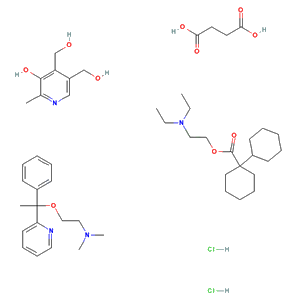| Identification |
| Name: | Bendectin |
| Synonyms: | Benedectin.;4,5-bis(hydroxymethyl)-2-methyl-pyridin-3-ol: butanedioic acid: 2-diet hylaminoethyl 1-cyclohexylcyclohexane-1-carboxylate: N,N-dimethyl-2-(1 -phenyl-1-pyridin-2-yl-ethoxy)ethanamine: dihydrochloride;bendectin;Bendectin (old formulation);Butanedioic acid, compd. with N,N-dimethyl-2-(1-phenyl-1-(2-pyridinyl)ethoxy)ethanamine (1:1), mixt. with 2-(diethylamino)ethyl (1,1'-bicyclohexyl)-1-carboxylate hydrochloride and 5-hydroxy-6-methyl-3,4-pyridinedimethanol hydrochloride;Butanedioic acid, compd. with N,N-dimethyl-2-(1-phenyl-1-(2-pyridinyl)ethoxy)ethanamine (1:1),mixt. with 2-(diethylamino)ethyl(1,1'-bicyclohexyl)-1-carboxylate hydrochloride and 5-hydroxy-6-methyl-3,4-pyridinedimethanol hydrochloride;Doxylamine succinate mixt. with 2-(diethylamino)ethyl (1,1'-bicyclohexyl)-1-carboxylate hydrochloride and 5-hydroxy-6-methyl-3,4-pyridinedimethanol hydrochloride;Lenotan |
| CAS: | 8064-77-5 |
| Molecular Formula: | C19H35NO2 . C17H22N2O . C8H11NO3 . C4H6O4 . 2ClH |
| Molecular Weight: | 0 |
| InChI: | InChI=1/C19H35NO2.C17H22N2O.C8H11NO3.C4H6O4.2ClH/c1-3-20(4-2)15-16-22-18(21)19(13-9-6-10-14-19)17-11-7-5-8-12-17;1-17(20-14-13-19(2)3,15-9-5-4-6-10-15)16-11-7-8-12-18-16;1-5-8(12)7(4-11)6(3-10)2-9-5;5-3(6)1-2-4(7)8;;/h17H,3-16H2,1-2H3;4-12H,13-14H2,1-3H3;2,10-12H,3-4H2,1H3;1-2H2,(H,5,6)(H,7,8);2*1H |
| Molecular Structure: |
 |
| Properties |
| Melting Point: | 207 deg C |
| Flash Point: | 116.5°C |
| Boiling Point: | 399.8°C at 760 mmHg |
| Density: | g/cm3 |
| Solubility: | 1 g dissolves in about 4.5 ml water, 90 ml alcohol; sol in propylene glycol; sparingly sol in acetone; insol in ether, chloroform
Soluble in alc, acetone; slightly soluble in other organic solvents.
In water, 2.2X10+5 mg/l, temp not specified. |
| Specification: |
Bendectin (CAS NO.8064-77-5) is also called Debendox ; Doxylamine succinate mixt. with 2-(diethylamino)ethyl (1,1'-
bicyclohexyl)-1-carboxylate hydrochloride and 5-hydroxy-6-methyl-3,4-pyridinedimethanol hydrochloride ; Lenotan ; Butanedioic acid, compd. with N,N-dimethyl-2-(1-phenyl-1-(2-pyridinyl)ethoxy)ethanamine (1:1), mixt. with 2-(diethylamino)ethyl (1,1'-bicyclohexyl)-1-carboxylate hydrochloride and 5-hydroxy-6-methyl-3,4-pyridinedimethanol hydrochloride ; Butanedioic acid, compd. with N,N-dimethyl-2-(1-phenyl-1-(2-pyridinyl)ethoxy)ethanamine (1:1),mixt. with 2-(diethylamino)ethyl(1,1'-bicyclohexyl)-1-carboxylate hydrochloride and 5-hydroxy-6-methyl-3,4-pyridinedimethanol hydrochloride . Bendectin (CAS NO.8064-77-5) is white powder. It is slightly soluble in water. Bendectin is a mixture of esters and amines. Esters react with acids to liberate heat along with alcohols and acids. Strong oxidizing acids may cause a vigorous reaction that is sufficiently exothermic to ignite the reaction products. Heat is also generated by the interaction of esters with caustic solutions. Flammable hydrogen is generated by mixing esters with alkali metals and hydrides. Amines are chemical bases. They neutralize acids to form salts plus water. These acid-base reactions are exothermic. The amount of heat that is evolved per mole of amine in a neutralization is largely independent of the strength of the amine as a base. Amines may be incompatible with isocyanates, halogenated organics, peroxides, phenols (acidic), epoxides, anhydrides, and acid halides. Flammable gaseous hydrogen is generated by amines in combination with strong reducing agents, such as hydrides. Symptoms of exposure to Benedectin may include drowsiness; lethargy; fatigue; disorientation; dizziness; unsteady gait; tinnitus; headache; blurred vision; nervousness; tremors; irritability; epigastric pain; nausea; vomiting; diarrhea and/or constipation; dry mouth; palpitations; hallucinations; hypnosis; coma and seizures. Flash point data for Benedectin are not available. Benedectin is probably combustible.
|
| Flash Point: | 116.5°C |
| Color: | Platelets or thick, birefringent rods from alcohol + acetone
PLATES FROM ALCOHOL, ACETONE
COLORLESS OR WHITE CRYSTALS OR WHITE CRYSTALLINE POWDER
White to practically white crystals or crystalline powder.
Colorless-white platelets |
| Safety Data |
| |
 |